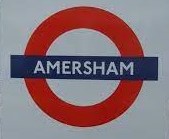24 June 2021
Down Hill
Chesham and Amersham.
By J R Thomas
 Amersham is a Home Counties market town famously divided by a hill. At the bottom is the old town, village really, which has been around since the Middle Ages, and at the top is the modern not so smart part, around the tube station, the very end of the Metropolitan line. But we must qualify our sneering remarks about ‘not so smart’; most of Amersham is very smart, compared at least with say, Hartlepool. To its east lies the also prime Tory territory of Chesham and these you would say on brief acquaintance are the Conservative heartlands, and until last week you would have been completely right.
Amersham is a Home Counties market town famously divided by a hill. At the bottom is the old town, village really, which has been around since the Middle Ages, and at the top is the modern not so smart part, around the tube station, the very end of the Metropolitan line. But we must qualify our sneering remarks about ‘not so smart’; most of Amersham is very smart, compared at least with say, Hartlepool. To its east lies the also prime Tory territory of Chesham and these you would say on brief acquaintance are the Conservative heartlands, and until last week you would have been completely right.
The local MP for almost thirty years had been Cheryl Gillan, latterly Dame Cheryl, a Conservative lady for whom the word ‘formidable’ might have coined. In 2019 the Dame won 55% of the vote; but alas, she died in April this year. That of course gives rise to a by-election, usually things of much media interest and speculation; but oddly in this case passing almost unnoticed until the result was announced. You would have had to be touring on the North Coast 500 to have missed the result; Ms Gillan’s huge majority was turned into one for Sarah Green, the LibDem candidate, who won 56% of the votes. This was a stonking setback for Boris and his Blue Wall, and perhaps even more so for Keir Starmer and his Almost New Labour. Or so the press and broadcast media rushed to tell us. But regular readers of these pieces will know what comes next.
Indeed, let us again say what we said after the Hartlepool result. Before rushing to rend your blue raiment, or book a firework display of gigantically orange proportions, look at the figures. Therein lies the key to how excited or miserable you should be, or perhaps more relevantly, how Boris and Keir should be. Now, admittedly, we cannot offer Sir Keir much comfort here; the Labour vote was 622, a record low for the Labour Party since, well, effectively, ever. Last time round, in 2019, Labour won just over 7,000 votes out of 55,000 cast, not a very impressive result either. So what we can say to Sir K is this: don’t worry, be happy (if you can); this result is meaningless. This is a seat which is never going to be Labour where even Labour voters may think that the best option is not to support the Labour candidate but vote to keep out any other one they particularly dislike. That is certainly what has happened this time round; we suspect that the voter on the ground knew well that the LibDem candidate was in with a chance and did not care for the new Conservative offering (we will come back to that) – and so even if they disliked every aspect of Lib Dem policies preferred Ms Green to the Tory. This would not and does not happen in seats where Labour has a chance, not even in Hartlepool where in spite of a poor candidate and a bad campaign the Labour vote was not too bad.
Let’s go back to that figure of 55,000 voters in 2019. That was 77% of those eligible to vote. Just under 30,850 of them went for Dame Cheryl. The LibDem scored 14,627. This time the Conservatives garnered 13,489 and the LibDems 21,517. Nobody else polled in any significance at all. The turnout was a touch under 38,000 – 52% of electors. An easy way to understand this is perhaps that all those previous Labour voters voted LibDem this time, and a large number of Tories stayed at home. Of course it will not be that simple, but we suspect the analysis is not that far off.
And why did the Tories stay at home? Tories are usually reliable attendees at the polls, a Conservatives strength being able to get their voters to the polling stations. But not this time. Some of that must be old nervous Tories not wanting to risk Covid, more must be ones who thought after Hartlepool that Chesham and Amersham would be safely in the Boris bag; more still perhaps were just not attracted by the Conservative candidate, or failed to respond to a very weak blue campaign.
Plus of course there are the issues. There is one big issue which is that the massive and disruptive scar of the HS2 railway line, London to Birmingham and maybe one day beyond, is going right across the constituency leaving a forever scar in the beautiful Chiltern hills. Not surprisingly this has not proved popular with the locals. Whether this was an election issue is hard to gauge as both the leading candidates were firmly against it (as was Dame Cheryl), though in both cases their party’s official line is equally firmly for it. But there are large, popular and noisy campaigns locally against the line and the by-election was certainly seen as an opportunity to register a protest vote. Maybe a number of voters did, if only by staying away.
Equally the government’s new planning policies are proving unpopular in the Tory heartlands. We may all want cheaper housing, we may want more housing, but we do not want it near where we live; by attempting to circumvent the local ability to protest, the government is not doing itself any favours, and by making a hugely controversial aspect of political life less democratically visible the backlash is guaranteed (except perhaps amongst housebuilders). This almost certainly kept some voters at home, or tipped them into the LibDem support box.
But at risk of proving unpopular at Conservative garden fetes and soirees, your correspondent suggests there is a factor which is greater than these. Conservative Central Office arranged a local contest to choose the candidate to follow in Ms Gillan’s firm footsteps. Not much of a choice though; the three candidates were preapproved by Central Office. None of them were particularly impressive. Peter Fleet, an international businessman, was anointed; a man not local, not politically active or experienced, and with no particular outstanding qualities. The local association must have thought he was at least the best of a limited choice – he got over 50% on the initial ballot, which says something about his two rivals. Having chosen him, and presumably believing that Chesham and Amersham would vote for anybody wearing a blue rosette, the party underfunded the campaign and gave it little support – Boris visited just once, and few cabinet ministers made the long and arduous trek to the end of the Metropolitan line. Only in the last couple of days, when the canvass returns were presumably indicating the impending disaster, did leafletting and campaigning step up. The attitude is perhaps best summoned up by the defeated Mr Fleet, accusing the LibDems of “throwing all their resources at the campaign”. That, Mr F, for future reference, is how you win campaigns.
So, appalling campaign, weak candidate, not recognising issues that were bothering the voters: hardly that surprising a result. Next up, on 1st July, comes the much more interesting contest at Batley and Spen, where the existing Labour M.P. stepped down after having been elected Mayor of West Yorkshire. Safe Labour; red wall heartland; top Tory target. If Keir or Boris lose this, then there is trouble coming for the loser, and comfort for the winner. Now there is something to campaign for.
Thumbnail image on Cover page by Sunil060902 under CC2 license.


